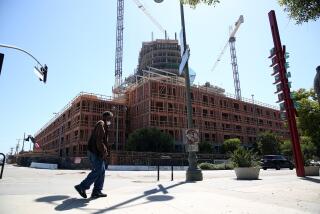Gov. Gavin Newsom wants the tech industry to help pay for new housing. But not for the neediest Californians

California’s housing affordability crisis over the past decade has coincided with a boom in tech-fueled job growth. Now Gov. Gavin Newsom is calling on Silicon Valley companies to make an unprecedented contribution to help build new homes — but his idea is drawing concern from some budget watchers and government ethics advocates who worry about the political influence the tech industry could gain.
Newsom said his administration is asking corporations to provide developers with low-interest loans to build housing for teachers, nurses and other middle-class Californians. Newsom indicated the companies’ total fundraising for the program would match the $500 million in public money he’s proposed in the state budget for the development of middle-income housing.
“The workforce housing issues have been exacerbated by the success of a lot of these companies,” Newsom said when presenting the budget last week. “I do not begrudge other people’s success. But that success is creating burdens and stress.”
Gov. Gavin Newsom threatens to cut state funding from cities that don’t approve enough housing »
Millions of jobs have been created in California’s strong economy since the recession, but there is not enough housing in the state to accommodate the influx of workers.
The Bay Area alone over the past eight years has added 750,000 jobs and only 167,000 new homes, according to construction industry statistics, prompting calls for Silicon Valley companies to do more to offset the impact on the housing market. A fall USC Dornsife/Los Angeles Times poll found that Bay Area respondents believed the rising influence of the tech industry was the primary contributor to the state’s housing affordability woes among eight options provided in the poll.
Newsom said he’s had conversations over the past six months with tech companies about ponying up more money for middle-income housing and his budget plan was designed to complement what the companies chip in. Middle-income housing is generally reserved for those making a specific percentage above an area’s median income; for example, a family of four in Los Angeles would qualify if they together earn up to $83,000 a year. At a roundtable on affordable housing issues in San Jose on Tuesday, Newsom said he would release full details of the effort later on.
But dedicating a half-billion dollars to middle-income housing means that money won’t go toward helping the state’s poorest residents. In its initial review of Newsom’s budget, the state’s nonpartisan Legislative Analyst’s Office said the housing needs of low-income Californians far outstrip the public money that’s available.
“The Legislature may want to consider whether it prefers to target the state’s limited housing resources toward the Californians most in need of housing assistance,” the analyst’s report said.
Newsom’s budget includes a significant influx of cash for low-income housing and homelessness, such as $300 million in tax credits to subsidize new development and an additional $300 million to help cities and counties build emergency shelters and provide other homeless services. At the event Tuesday, Newsom also announced that he signed an executive order to provide low-income housing developers with a list of state properties suitable for homebuilding with an eye toward getting affordable units built on the land within the next three years.
It remains unclear exactly how Silicon Valley businesses would pay for Newsom’s effort, but the kind of contribution the governor envisions is unusual, said Rey López-Calderón, executive director of California Common Cause, a government ethics watchdog group. Political campaign donations are often subject to limits and public disclosure, and when government officials direct payments to nonprofits, that also must be made public. But lawmakers recently did away with rules requiring their solicitation of private dollars to government agencies to be disclosed, López-Calderón said.
Technology companies face significant state regulations and legislation related to privacy and many other aspects of their business. Voters could question an arrangement in which the tech industry gives large amounts of money to a top Newsom priority, López-Calderón said.
“To an average citizen, does it undermine faith in government if these companies are kicking in tens of millions of dollars to advance the governor’s agenda?” he said. “It certainly could.”
Asked Tuesday if he had concerns about the nature of the contributions and public disclosure, Newsom said he hadn’t thought about the issue and planned to discuss it with administration attorneys.
“I’m not asking for a gift,” Newsom said. “I’m not asking for a nonprofit donation. I’m asking for a commitment, a public policy commitment. I’m not seeing a red flag, but it’s a legitimate question.”
Some Silicon Valley business leaders say they are ready to help the governor with his housing goals. Carl Guardino, head of the Silicon Valley Leadership Group, praised Newsom for deciding against proposing a new tax increase on the industry. This way, Guardino said, the region’s largest companies could contribute without costs falling on others.
“It’s a dollar amount that is absolutely audacious and we like audacious goals here,” Guardino said. “Since it’s a voluntary goal, it doesn’t force out the middle-class jobs that we need to keep.”
High housing prices are continuing to pressure Californians who are wondering whether they can afford to stay in the state.
At Tuesday’s forum, Newsom and San Jose Mayor Sam Liccardo heard from five residents and business owners concerned about the effects of high costs on their lives. Nuemi Guzman, 42, works as an assistant at a legal advocacy foundation in San Jose and grew up in Santa Clara County. But she, her husband and three young children had to move to Merced County to afford a home. Guzman said she wakes up before 5 a.m. every weekday and doesn’t typically get home until after 7 p.m. because of a five-hour round-trip commute.
“I see the struggle that my clients go through in that they can’t afford a house,” Guzman told Newsom and Liccardo. “I sit back and think, ‘I bought a house. How can I be complaining?’ But then I don’t see my children grow up. It’s just gotten harder and harder.”
Guzman said she and her family are considering moving to Arizona for more affordable living.
Coverage of California politics »
More to Read
Get the L.A. Times Politics newsletter
Deeply reported insights into legislation, politics and policy from Sacramento, Washington and beyond. In your inbox three times per week.
You may occasionally receive promotional content from the Los Angeles Times.







